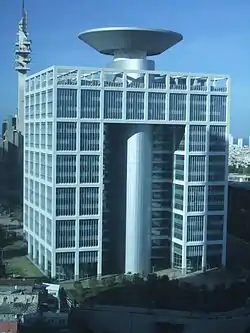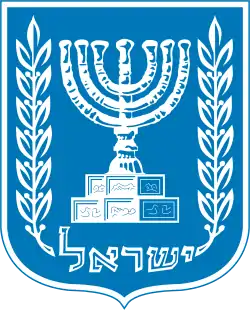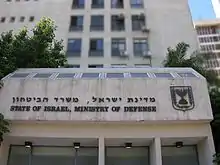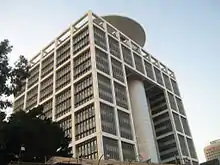Ministry of Defense (Israel)
The Ministry of Defense (Hebrew: מִשְׂרַד הַבִּטָּחוֹן, Misrad HaBitahon) of the government of Israel, is the governmental department responsible for defending the State of Israel from internal and external military threats. Its political head is the Defense Minister of Israel, and its offices are located in HaKirya, Tel Aviv.
| משרד הביטחון | |
 | |
 Ministry of Defense headquarters | |
| Agency overview | |
|---|---|
| Formed | 1948 |
| Jurisdiction | Government of Israel |
| Headquarters | Matcal Tower, HaKirya, Tel Aviv 32°4′30.97″N 34°47′24.55″E |
| Annual budget | 56 billion New Shekel |
| Minister responsible |
|
| Child agency | |
| Website | www |
The Ministry of Defense oversees most of the Israeli security forces, including the Israel Defense Forces (IDF), Israel Military Industries (IMI), and Israel Aerospace Industries (IAI).[1]
The MOD was established when the British Mandate of Palestine ended, and the British Army departed Palestine and the State of Israel was formed. This ended the rag-tag militia units during British rule and gave way to the formal defense of the Jewish state.
Minister of Defense

The Defense Minister of Israel (Hebrew: שַׂר הַבִּטָּחוֹן, Sar HaBitahon, lit. Minister of Security)[2] heads the ministry. The post is considered to be the second most important position in the Israeli cabinet, and usually has a Deputy Minister. The Defense Minister is also a permanent member of the Security Cabinet. Avigdor Lieberman of Yisrael Beiteinu was sworn in on 31 March 2016 as Israel's new Minister of Defense.
Due to the great importance of the defense portfolio, prime ministers have often held the position in addition to their prime ministerial duties; seven of the sixteen Defense Ministers to date were also serving Prime Ministers. Five of them (Moshe Dayan, Yitzhak Rabin, Ehud Barak, Shaul Mofaz and Moshe Ya'alon) are also former Chiefs of Staff of the Israel Defense Forces.
Amongst the duties of the post, Defense Ministers can request administrative detention. Because of the intensive work and the tension between the political echelon to the military echelon, frequently disagreements and difference of opinion are created between the Defense Minister and the Chief of Staff.
 |
|---|
| This article is part of a series on the politics and government of Israel |
|
|
List of ministers
| # | Minister | Party | Governments | Term start | Term end | Notes | |
|---|---|---|---|---|---|---|---|
| 1 | David Ben-Gurion | Mapai | P, 1, 2, 3, 4 | 14 May 1948 | 26 January 1954 | Serving Prime Minister | |
| 2 | Pinhas Lavon | Mapai | 5 | 26 January 1954 | 21 February 1955 | ||
| – | David Ben-Gurion | Mapai | 5, 6, 7, 8, 9, 10 | 21 February 1955 | 26 June 1963 | Serving Prime Minister | |
| 3 | Levi Eshkol | Mapai, Alignment | 11, 12, 13 | 26 June 1963 | 5 June 1967 | Serving Prime Minister | |
| 4 | Moshe Dayan | Rafi, Labor Party, Alignment | 13, 14, 15, 16 | 5 June 1967 | 3 June 1974 | ||
| 5 | Shimon Peres | Alignment | 17 | 3 June 1974 | 20 June 1977 | ||
| 6 | Ezer Weizman | Likud | 18 | 20 June 1977 | 28 May 1980 | ||
| 7 | Menachem Begin | Likud | 18 | 28 May 1980 | 5 August 1981 | Serving Prime Minister | |
| 8 | Ariel Sharon | Likud | 19 | 5 August 1981 | 14 February 1983 | ||
| – | Menachem Begin | Likud | 19 | 14 February 1983 | 23 February 1983 | Serving Prime Minister | |
| 9 | Moshe Arens | Likud | 19, 20 | 23 February 1983 | 13 September 1984 | ||
| 10 | Yitzhak Rabin | Alignment | 21, 22, 23 | 13 September 1984 | 15 March 1990 | ||
| – | Moshe Arens | Likud | 24 | 11 June 1990 | 13 July 1992 | ||
| – | Yitzhak Rabin | Labor Party | 25 | 13 July 1992 | 4 November 1995 | Serving Prime Minister, assassinated | |
| – | Shimon Peres | Labor Party | 25, 26 | 4 November 1995 | 18 June 1996 | Serving Prime Minister | |
| 11 | Yitzhak Mordechai | Likud | 27 | 18 June 1996 | 25 January 1999 | ||
| – | Moshe Arens | Likud | 27 | 27 January 1999 | 6 July 1999 | ||
| 12 | Ehud Barak | One Israel | 28 | 6 July 1999 | 7 March 2001 | Serving Prime Minister | |
| 13 | Binyamin Ben-Eliezer | Labor Party | 29 | 7 March 2001 | 2 November 2002 | ||
| 14 | Shaul Mofaz | Likud | 29, 30 | 4 November 2002 | 4 May 2006 | Not an MK at start of term in office | |
| 15 | Amir Peretz | Labor Party | 31 | 4 May 2006 | 18 June 2007 | ||
| – | Ehud Barak | Labor Party, Independence | 31, 32 | 18 June 2007 | 18 March 2013 | Not an MK at start of term in office | |
| 16 | Moshe Ya'alon | Likud | 33, 34 | 18 March 2013 | 22 May 2016 | ||
| – | Benjamin Netanyahu | Likud | 34 | 22 May 2016 | 30 May 2016 | Serving Prime Minister Acting minister | |
| 17 | Avigdor Lieberman | Yisrael Beiteinu | 34 | 30 May 2016 | 18 November 2018[3] | ||
| 19 | Benjamin Netanyahu[4][5] | Likud | 34 | 18 November 2018[3] | 8 November 2019 | Serving Prime Minister | |
| 20 | Naftali Bennett | New Right | 34 | 8 November 2019 | 17 May 2020 | ||
| 21 | Benny Gantz | Blue and White | 35 | 17 May 2020 | |||
Deputy ministers
| # | Minister | Party | Governments | Term start | Term end |
|---|---|---|---|---|---|
| 1 | Shimon Peres | Mapai | 9, 10, 11, 12 | 21 December 1959 | 25 May 1965 |
| 2 | Zvi Dinstein | Alignment | 13 | 17 January 1966 | 5 June 1967 |
| 3 | Mordechai Tzipori | Likud | 18, 19 | 28 June 1977 | 10 October 1983 |
| 4 | Michael Dekel | Likud | 21, 22 | 3 December 1985 | 21 November 1988 |
| 5 | Ovadia Eli | Likud | 24 | 8 July 1991 | 13 July 1992 |
| 6 | Mordechai Gur | Labor Party | 25 | 4 August 1992 | 16 July 1995 |
| 7 | Ori Orr | Labor Party | 26 | 27 November 1995 | 18 June 1996 |
| 8 | Silvan Shalom | Likud | 27 | 9 July 1997 | 6 July 1999 |
| 9 | Efraim Sneh | One Israel | 28 | 5 August 1999 | 7 March 2001 |
| 10 | Dalia Rabin-Pelossof | Labor Party | 29 | 7 March 2001 | 1 August 2002 |
| 11 | Weizman Shiry | Labor Party | 29 | 12 August 2002 | 2 November 2002 |
| 12 | Ze'ev Boim | Likud Kadima | 30 | 5 March 2003 | 18 January 2006 |
| – | Efraim Sneh | Labor Party | 31 | 30 October 2006 | 18 June 2007 |
| 13 | Matan Vilnai | Labor Party | 31, 32 | 2 July 2007 | 18 January 2011 |
| 14 | Danny Danon | Likud | 33 | 18 March 2013 | 15 July 2014 |
| 15 | Eli Ben-Dahan | The Jewish Home | 34 | 19 May 2015 | Incumbent [3] |
Directors General

| # | Director General | Term start | Term end |
|---|---|---|---|
| 1 | Levi Eshkol | 1948 | 1948 |
| 2 | Eliezer Peri | 1948 | 1949 |
| 3 | Pinchas Sapir | 1949 | 1951 |
| 4 | Ze'ev Schind | 1951 | 1952 |
| 5 | Shimon Peres (acting) | 1952 | 1953 |
| – | Shimon Peres | 1953 | 1959 |
| 6 | Asher Ben-Natan (acting) | 1959 | 1960 |
| – | Asher Ben-Natan | 1960 | 1965 |
| 7 | Moshe Kasti | 1965 | 1970 |
| 8 | Yeshayahu Lavie | 1970 | 1972 |
| 9 | Yitzhak Ironi | 1972 | 1975 |
| 10 | Pinhas Zusman | 1975 | 1978 |
| 11 | Yosef Ma'ayan | 1978 | 1981 |
| 12 | Avraham Ben Yosef | 1981 | 1982 |
| 13 | Aharon Bet-Halachmi | 1982 | 1983 |
| 14 | Menachem Maron | 1983 | 1986 |
| 15 | David Ivry | 1986 | 1996 |
| 16 | Ilan Biran | 1996 | 1999 |
| 17 | Amos Yaron | 1999 | 2005 |
| 18 | Jacob Toren | 2005 | 2006 |
| 19 | Gabi Ashkenazi | 2006 | 2007 |
| 20 | Pinchas Buchris | 2007 | 2010 |
| 21 | Ehud Shani | 2010 | 2013 |
| 22 | Dan Harel | 2013 | 2016 |
| 23 | Udi Adam | 2016 | 2020 |
| 24 | Amir Eshel | 2020 | present |
Structure
- Home Front Defense Ministry, headed by the Deputy Defense Minister
- Israeli National Emergency Authority, Rahel
- Administration for the Development of Weapons and Technological Infrastructure, Maf'at
- Coordinator of Government Activities in the Territories, Matpash
- Director of Security of the Defense Establishment, Malmab
- Defense Establishment Comptroller Unit
- Defense Political Branch, Abtam
- Defense Aid Branch, Sibat
- Computer and Management information systems, Malam – Data Processing Center
- Logistics Operations and properties Branch, Emun
- Defense Social branch
- Department of Defense Export Control, Api
- Tank program Directorate
- Procurement and Production Directorate, Manhar
- Emergency management, Melakh
- Ombudsman for soldiers, Nakhal
- Fund and Unit for Discharged Soldiers
- Department of Families and Remembrance
- Disabled Rehabilitation Division
Notes
- Israel Ministry of Defense (in Hebrew)
- In Israel, although the "Security Minister" (שר הביטחון) title is translated in English as "Defense Minister," in Hebrew, the Defense Ministers of other countries are more often referred to as "Defense Minister" (Hebrew: שר ההגנה, Sar HaHagana).
- Raoul Wootliff (18 November 2018). "After Jewish Home anger, Netanyahu says he'll reappoint deputy defense minister". The Times of Israel. Retrieved 18 November 2018.
- "Archived copy". Archived from the original on 18 November 2018. Retrieved 16 November 2018.CS1 maint: archived copy as title (link)
- "Israel's Benjamin Netanyahu takes over defence job as coalition falters". The Straits Times. 16 November 2018.
